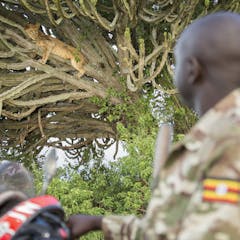
Articles on Protected areas
Displaying 1 - 20 of 47 articles

There are 401 indigenous terrestrial reptiles in South Africa.

Proper biodiversity conservation requires long-term commitments to protect areas of land and water, as laid down in international guidelines.

Forest elephants are endangered in Nigeria. Habitat protection, community awareness campaigns, research and stronger regulations could save them from going extinct.

Mangroves do a surprising amount for us. But we’re often not looking after them. Here’s how we can protect these forests of the sea edge better.

Most of Iran is wild and beautiful, but development threatens to degrade highly-prized ecosystems. Now new research is honing in on the hotspots, to preserve biodiversity in expanded protected areas.

Global summits to arrest Earth’s deteriorating health look increasingly farcical.

The planet is entering its sixth mass extinction event. This global nature summit is our best change to stop this tide of destruction.

Negotiators hope to put humanity on a path to harmonious coexistence with nature by 2050.

Governments, scientists and conservation groups are working to protect 30% of Earth’s land and water for nature by 2030. Two scientists explain why scale matters for reaching that goal.

Militias mete out violence far from the centres of power – but their dirty work is politically useful.

Federal Environment Minister Tanya Plibersek acknowledges “it’s time to change” after the State of the Environment report revealed a bleak picture of Australia’s natural places. In a speech on Tuesday…

We compiled the first list of Antarctic species and where they were first found. This knowledge means we can now protect all of the icy continent’s species.

Legal hunting helps rhino conservation for biological and socio-economic reasons.

African wild dogs are used to evading hyenas and lions. Genetic research suggests they are using the same strengths to get around human development as well.

New study compared sites with similar distances from cities and population densities.

Africa’s public and private protected areas took a massive blow from the collapse in tourism because of the pandemic. Tourism is a key source of funding for managing protected areas.

One-fifth of Earth’s land could be restored to wilderness by reintroducing animals and improving management.

Researchers have come up with a new framework that assigns an invasive species threat score to World Heritage Sites. This will improve how these species monitored and managed.

The Earth is losing plants and animals at rates not seen in millions of years. Ecologists explain how protecting habitat on working lands – farms, forests and ranches – can help conserve species.

New research found nearly half of land-based ecosystems and threatened species in Australia have inadequate protections. Yet most of the budget for national parks will go to infrastructure upgrades.
